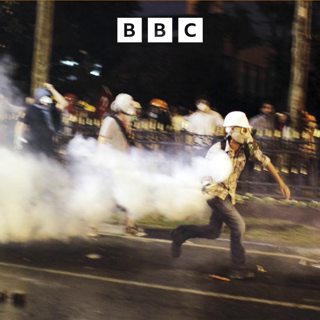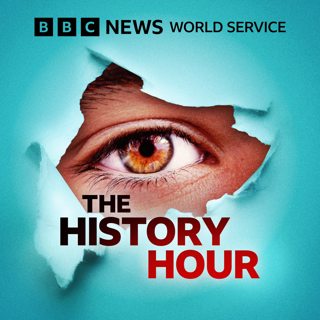
Gezi Park protests and MAD hijack
Max Pearson presents a collection of this week’s Witness History episodes from the BBC World Service.We hear from activist and actor Memet Ali Alabora on how his social media post contributed to the civil unrest following the Gezi Park protests in Turkey in 2013.Our guest, Selin Girit who covers Turkey for BBC World Service, talks to us about Turkey's important position between Europe and Asia. We also learn about the fighting in 1980 between the left and right-wing groups that led to Turkey’s military taking control of the country. Vice Admiral Isik Biren, who was an official in the defence ministry, and a former student activist, Murat Celikkan recount their different memories of the coup. We hear more about Turkey’s geographic connection from Harvey Binnie who was involved with the design of the first Bosphorus suspension bridge in 1973. And from Zimbabwe, economist Professor Gift Mugano, on how the country’s annual inflation rate was 89.7 sextillion percent in 2008. And finally the story of how a Nigerian Airways flight from Lagos to Abuja was hijacked by four teenagers calling themselves the Movement for the Advancement of Democracy (MAD). Obed Taseobi was a passenger on that flight in 1993.Contributors: Memet Ali Alabora – activist and actor Selin Girit – BBC World Service reporter Vice Admiral Isik Biren – former official in the Turkish defence ministry Murat Celikkan – former student activist Harvey Binnie – member of design team for the Bosphorus bridge Professor Gift Mugano – economist Obed Taseobi – Nigerian Airways passenger(Photo: Protesters clash with Turkish police near Gezi Park in Istanbul, June 2013. Credit: Getty Images)
27 Okt 202351min

Osmondmania! and the launch of Lagos Fashion Week
Max Pearson presents a collection of this week’s Witness History episodes from the BBC World Service.We hear about Osmondmania! The moment in 1973 when teenage fans of American heartthrobs, The Osmonds, caused a balcony at Heathrow to collapse.Also, we find out about the first peace walk in Cambodia and how it united a country torn apart by war.Plus, the birth of Lagos Fashion Week and how it put Nigerian design on the global map.Contributors: Donny Osmond. Josephine McDermott, BBC producer and presenter. Yeshua Moser-Puangsuwan, organiser of Cambodia’s first peace walk. Parul Akhter, a sewing machinist who survived the Rana Plaza building collapse. Oscar Maynez, a forensic scientist who used to work in the Mexican border town of Ciudad Juarez where hundreds of young women were kidnapped or killed. Paula Flores, the mother of one of the murdered girls. Omoyemi Akerele who organised the first Lagos Fashion Week.(Photo: Donny Osmond greets fans at Heathrow airport. Credit: George Stroud/Express/Hulton Archive via Getty Images)
20 Okt 202350min

The creation of Ghana's flag and the oldest person at primary school
Max Pearson presents a collection of this week’s Witness History episodes from the BBC World Service.We hear from Kwasi Okoh about how his mother Theodosia Okoh designed Ghana’s flag after it became the first country in sub-Saharan Africa to gain independence.Our guest, former diplomatic and foreign affairs editor, Tim Marshall, explains the importance of flags for national identity and their changing purpose through history. We also learn about the moment in 1966 when Kwame Nkrumah, one of Africa's most famous leaders, was ousted from power in Ghana. Plus, how in 2013, India's Supreme Court made a landmark ruling aimed at transforming the lives of acid attack survivors. It followed a campaign led by Laxmi Agarwal who at the age of 15 was burned when acid was thrown at her.And the artist Yinka Shonibare discusses how ‘Nelson’s Ship in a Bottle’ exhibited in London’s Trafalgar Square was the world’s largest ship in a bottle.And finally, how Kimani Maruge became the oldest man to enroll at a primary school in Kenya.Contributors: Kwasi Okoh - son of Theodosia Okoh Tim Marshall - former diplomatic and foreign affairs editor for Sky News Chris Hesse - Ghanaian filmmaker Laxmi Agarwal - acid attack survivor Yinka Shonibare - creator of Nelson’s Ship in a Bottle Jane Obinchu - Kimani Maruge’s former teacher(Photo: Ghanaian football fans wave their national flag. Credit: Getty Images)
13 Okt 202351min

Marking 50 years since the 1973 global oil crisis
Max Pearson presents a collection of this week’s Witness History episodes from the BBC World Service. To mark 50 years since the global oil crisis, we’re focusing on oil - from discovery to disaster. We hear from Dr Fadhil Chalabi, then the deputy secretary general of Opec (Organisation of the Petroleum Exporting Countries) about what happened during the 1973 crisis. Our guest Helen Thompson, Professor of Political Economy at Cambridge University, explains why oil became the lifeblood of industrial economies during the last two centuries. We also learn how Kazakhstan signed ‘the deal of the century’ to become a fossil fuel powerhouse thanks to the Tengiz Oil Field.Plus, why in 1956, not everyone welcomed the discovery of oil in the Nigerian village of Oloibiri. We find out more about the devastating impact of one of the world’s largest oil spills - when the Amoco Cadiz tanker ran aground off the coast of France in 1978. The wreck released more than 220,000 tonnes of crude oil into the sea.And finally, how an indigenous community in the Ecuadorian Amazon fought a court battle to protect their land from oil drilling – and won.Contributors: Dr Fadhil Chalabi – former deputy secretary general of Opec Professor Helen Thompson - Professor of Political Economy at Cambridge University Bruce Pannier - Central Asia news correspondent Chief Sunday Inengite – chief of Oloibiri, Nigeria Marguerite Lamour – former secretary to Alphonse Arzel, the mayor of Ploudalmézeau in France Jose Gualing - former Sarayaku president Ena Santi - Sarayaku community leader(Photo: Oil rig. Credit: Fairfax Media via Getty Images via Getty Images)
6 Okt 202352min

The Lampedusa disaster and cat cafes
Max Pearson presents a collection of this week’s Witness History episodes from the BBC World Service. We hear about the sinking of a migrant boat off Lampedusa in 2013 which was one of the Mediterranean’s worst shipwrecks. Also, we find out about Wally Hendrickson, the US physicist who volunteered to be dropped into the front line of the Vietnam War to remove fuel rods from a reactor. Plus, the opening of the world's first cat cafe in Taipei, Taiwan, in 1998.Contributors: Amnasager Araya who survived the Lampedusa tragedy after being rescued by Vito Fiorino. Annalisa Camilli, correspondent for Internazionale magazine. Wally Hendrickson who removed the fuel rods from the reactor in Vietnam. André Turcat, the French pilot of Concorde’s maiden flight. The star of the telenovela, Kassandra, Coraima Torres, and Tony Paez who distributed the show. Tracy Chang, founder of the first cat cafe in Taiwan. (Photo: A woman on a boat heading for Lampedusa. Credit: Getty Images)
29 Sep 202350min

Nazi eugenics and the year of the vuvuzela
Max Pearson presents a collection of this week’s Witness History episodes from the BBC World Service.We hear about the people with disabilities who were sterilised in Germany following an order in 1933, passed by the then Chancellor Adolf Hitler.Also, we find out about the first man to descend into the “Gates of Hell”, the Darvaza Crater, in Turkmenistan.Plus the story behind the vuvuzela which was dubbed the “world’s most annoying instrument”.Contributors: Helga Gross who was sterilised in Germany as part of the Nazis’ eugenics order. This is an archive interview from the United States Holocaust Memorial Museum. Dr Susanne Klausen, Julia Gregg Brill Professor of Women's, Gender and Sexuality Studies at the Pennsylvania State University. Campaigner Emma Bonino who fought for legal abortion in Italy. Explorer George Kourounis who was the first person to descend into the Darvaza Crater, in Turkmenistan. Paramedic Daniel Ouma who helped people injured in the Westgate Mall terror attack, in Nairobi, in Kenya, in 2013. Freddie 'Saddam' Maake who claims to have invented the vuvuzela.(Photo: Adolf Hitler. Credit: Gamma-Keystone via Getty Images)
22 Sep 202351min

Israeli and Palestinian history
Max Pearson presents a collection of this week's Witness History episodes from the BBC World Service. It's thirty years since the Oslo Accords were signed. This agreement in 1993 aimed to bring about peace between the Israelis and Palestinians. So this week, we're bringing you stories from Israeli and Palestinian history. We hear about attempts at peace - the secret talks behind the Oslo Accords, and President Bill Clinton's failed attempt to end the conflict at Camp David. Plus, one of the most dramatic sieges of the Israeli-Palestinian conflict that took place in a church. We also hear from a Palestinian and an Israeli who were there when rioting broke out in 2000, after the Israeli opposition leader, Ariel Sharon, made a visit to the al-Aqsa Mosque compound. And finally a hope of peace with the orchestra, made up of young people from both sides of the conflict, which performed a concert in the Palestinian city of Ramallah.Contributors: Mona Juul – Norwegian diplomat who was part of the team that planned and orchestrated the meetings which resulted in the signing of the Oslo Accords. Yolande Knell - Middle East Correspondent for BBC News. Gamal Helal - American diplomatic interpreter and policy adviser. Khaled Zeghari - Palestinian cameraman. Zalman Shoval - former Israeli ambassador to Washington. Carolyn Cole - photojournalist. Father Amjad Sabbara - Franciscan friar. Tyme Khelefi - former violinist with the West-Eastern Divan orchestra. Daniel Cohen - former violinist with the West-Eastern Divan orchestra.(Photo: Israeli soldiers run towards the Church of the Nativity. Credit: Musa Al-Shaer/AFP via Getty Images)
15 Sep 202351min

The Chilean coup and Zanzibar’s most famous singer
Max Pearson presents a collection of this week's Witness History episodes from the BBC World Service. We hear from Chilean politician Hermógenes Pérez de Arce, who helped oust President Allende in 1973. We also hear from the widow of folk singer Victor Jara, who was killed during the military coup.Our guest is Dr Camila Vergara, who is a historian and journalist from Chile, and a senior lecturer at the University of Essex Business School in the UK. She tells us more about the aftermath of the Chilean coup, and its lasting impact.Eva Franchell speaks about her friend, the Swedish foreign minister Anna Lindh who was murdered in 2003.In the second half of the programme, campaigner Frank Heweston shares his experience on Greenpeace’s Arctic voyage to disrupt drilling on a newly built oil rig and we hear from a friend and promoter of Zanzibar’s most famous musician, Bi Kidude. Contributors: Camila Vergara - historian and journalist from Chile, and senior lecturer at the University of Essex Business School. Hermógenes Pérez de Arce – Chilean politician. Joan Jara – widow of Victor Jara. Eva Franchell – Anna Lindh’s former press secretary and best friend. Maryam Hamdani - friend and promoter of Bi Kidude.(Photo: President Salvador Allende. Credit: Bettman/Getty Images)
9 Sep 202351min






















